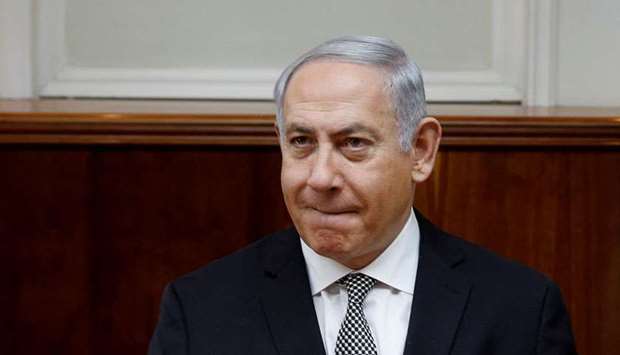* Tensions have flared along Israel's border with Gaza
* Netanyahu had been due to go to Colombia from August 6-9 Israeli Prime Minister Benjamin Netanyahu has cancelled a South American trip planned for next week due to the situation around the Gaza Strip, an Israeli official said on Thursday, as UN ceasefire talks pressed on.
Netanyahu will convene his security cabinet on Sunday to discuss an emerging deal, brokered by the United Nations and Egypt, for long-term peace in Gaza, a second Israeli official said, speaking on condition of anonymity.
Netanyahu was due to travel to Colombia from August 6-9.
Tensions have flared in recent weeks along the border between Israel and Gaza - Palestinian territory which is controlled by Hamas.
On Sunday, Nickolay Mladenov, the UN special coordinator for the Middle East peace process, said on Twitter that he held "productive meetings" with Egyptian officials in efforts to de-escalate Gaza tensions and resolve humanitarian issues.
"The devil is always in the details but we are #movingforward in the interest of #peace," Mladenov said.
The talks are being held in Cairo, though Mladenov said he had also held meeting with Palestinian leaders in the occupied West Bank.
In Gaza, Hamas said some of its top-ranking officials were expected to arrive from Egypt late on Thursday to discuss the deal.
"The delegation will arrive in Gaza for consultation over issues of concern for the Palestinian people, foremost in achieving the national reconciliation and ending the Gaza blockade," Hamas spokesman Fawzi Barhoum said.
A source in Hamas, speaking on condition of anonymity, said the delegation included the group's deputy chief, Saleh al-Arouri, exiled by Israel in 2010.
Israeli and Palestinian leaders have divulged few details of the talks.
"The fact that the trip (to Colombia) has been called off shows that the prime minister has a feeling that these are decisive days, these are days that it is imperative that he should stay in the country, and he knows why," Regional Cooperation Minister Tzachi Hanegbi told Army Radio.
More than two million Palestinians are packed into the narrow coastal enclave which suffers deep economic hardship.
Israel withdrew its troops and settlers from Gaza in 2005, but maintains tight control of its land and sea borders, citing security concerns over Hamas and other militant groups. Egypt also restricts movement in and out of Gaza on its border.
Four months of weekly Palestinian protests along the border have calmed slightly but organisers have said they will continue until Israel lifts economic sanctions on Gaza.
At least 155 Palestinians have been killed in the protests and one Israeli soldier was shot dead by a Gaza sniper. Palestinian militants have also fired hundreds of rockets over the border, drawing dozens of Israeli air and tank strikes.
Israel has lost tracts of farmland and forests to fires set by kites and helium balloons laden with incendiary material and flown over the border by Palestinians in Gaza.
On Wednesday, Israel said it was stopping shipments of fuel and gas to Gaza.
The move, Defence Minister Avigdor Lieberman said on Thursday, was in response to a continuation of cross-border violence, despite assurances from Egypt that it would end.
Palestinians in Gaza suffer up to 20 hours of power cuts per day due to fuel shortages.
"We acceded to Egypt's request," Lieberman told reporters. "We allowed in gas and fuel, but there was an additional Egyptian commitment that there would be no more launches, no kites, no conflagrations, no friction along the fence."
"Since those things are continuing, I decided to stop the supplies of gas and fuel to the Gaza Strip," he said.

